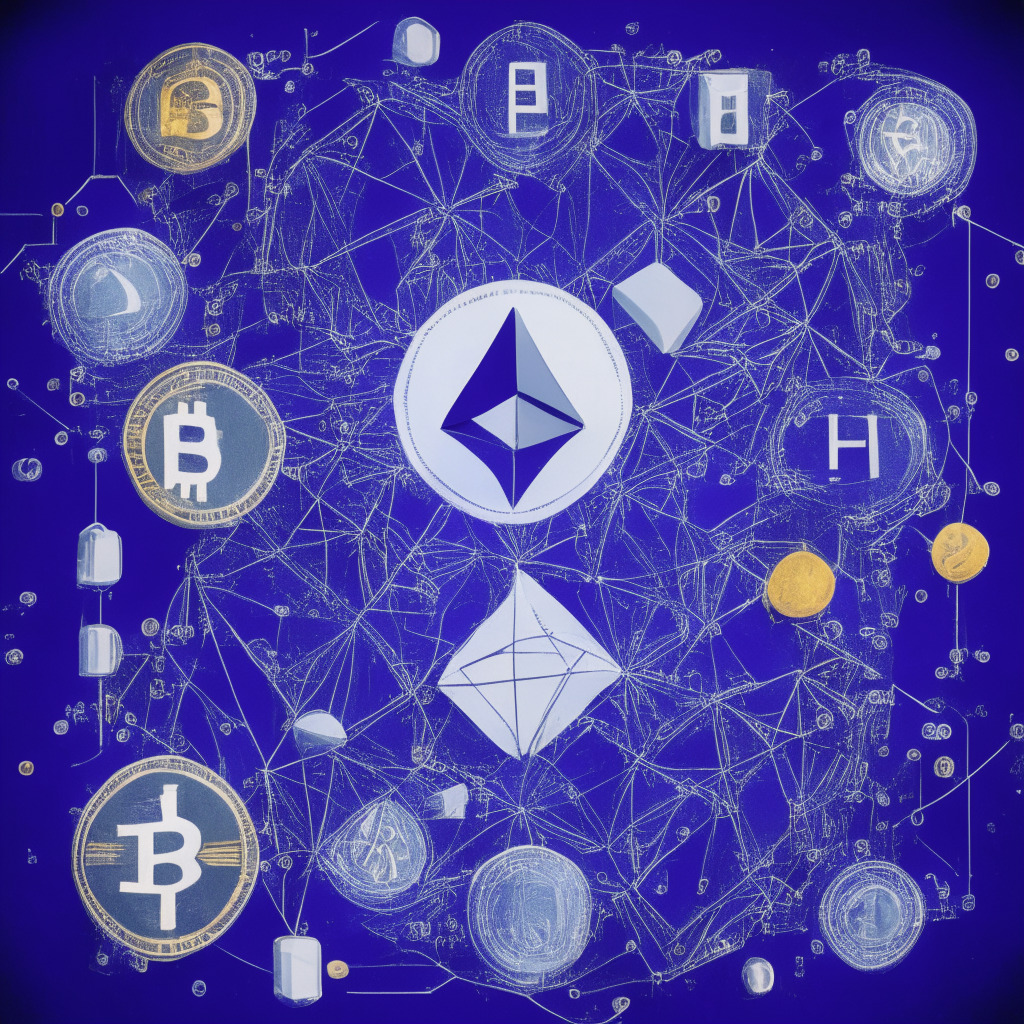The Federal Reserve Bank of Atlanta’s Policy Hub report discusses Web3’s implications for financial services, touching upon blockchains, DeFi, financial infrastructure, regulatory challenges of DAOs, and central bank digital currencies (CBDCs), highlighting the importance of balancing innovation and regulation.
Search Results for: digital payment token services
Visa Explores Ethereum’s Goerli Testnet for Transaction-Free Payments: Pros, Cons & Conflict
Visa has been utilizing Ethereum’s Goerli testnet and a smart contract called Paymaster to explore transaction-free payments in digital currencies. This method enables users to pay gas fees with any token, eliminating the need for Ether and potentially enhancing payment experiences in the crypto space.
Crypto.com Upgrades Payment Services: Enhanced User Experience or Complication?
Crypto.com announces an upgrade to its payment services, adding new features and support for more cryptocurrencies to improve user experience. The platform integrated a DeFi Wallet into Crypto.com Pay and now supports MATIC, USDC, and DAI, expanding its reach globally.
Liechtenstein Accepts Bitcoin for State Services: Exploring Diverse Crypto Approaches Worldwide
Liechtenstein’s government plans to accept Bitcoin for state services, reflecting a progressive approach towards cryptocurrencies. However, regulators like New York’s Attorney General enforce strict measures, like the proposed ‘Crypto Regulation, Protection, Transparency, and Oversight Act,’ to safeguard users’ investments.
Ripple’s Major Milestone: Singapore MPI License Amid Regulatory Scrutiny in the US
Ripple Markets APAC Pte Ltd, the Singapore branch of crypto-payment giant Ripple, has received its Major Payments Institution license from the Monetary Authority of Singapore. This permits Ripple to provide digital payment token services, marking a substantial stride towards wider crypto acceptance. In contrast to its regulatory challenges in the US, Ripple’s journey in Singapore has shown regulatory clarity and fostered a secure environment encouraging crypto investigation.
Emergence of Regulated Crypto Exchanges: Boon or Bane for the Crypto Industry?
“Blockchain.com has been granted a major payment institution license by the Monetary Authority of Singapore, permitting it to offer regulated digital payment token services to international clients. This reflects Singapore’s ongoing support for crypto companies, contributing to discussions about the impact of increasing regulatory controls on crypto’s foundational values and innovation.”
Blockchain.com Secures Singapore’s MPI License: Balancing Crypto Innovation with Strict Regulation
“Crypto exchange, Blockchain.com, has secured a Major Payment Institution (MPI) license from the Monetary Authority of Singapore (MAS), following its preliminary endorsement last October. This development underscores the exchange’s expansion of its Digital Payment Token services to its institutional clients and investors in Singapore.”
Circle’s MPI License Win: Boost for Singapore’s Crypto Market & Future Challenges
Circle Internet Singapore has been granted a Major Payment Institution license by the Monetary Authority of Singapore, allowing them to offer digital payment token services and money transfer services. This highlights Singapore’s dedication to fostering a supportive environment for blockchain and cryptocurrency technology.
Regulatory Turmoil: SEC’s Coinbase Decision, Circle’s Singapore License & Delayed Philippine Framework
The US Court of Appeals for the Third Circuit recently ordered the SEC to clarify its position on a rulemaking petition from Coinbase, while Circle Singapore secured its MPI license for digital payment token services. The Philippines’ SEC delayed the issuance of a digital assets framework, and Ark Investment Management purchased $21.6 million in Coinbase shares after the SEC lawsuit caused prices to drop.
Singapore MPI License for Circle: Stablecoin Progress or Restrictive Regulations?
Circle Singapore, an affiliate of Circle Internet Financial, received a Major Payment Institution (MPI) license from the Monetary Authority of Singapore (MAS). This allows them to offer digital payment token services, cross-border and domestic money transfers within Singapore. The move signifies regulatory progress in the cryptocurrency and blockchain industries, but proposed restrictions on stablecoin activities like lending and staking raise concerns.
Ripple’s Rise in Singapore vs. Coinbase’s Legal Quagmire: Paving the Path for Crypto Regulation
The Monetary Authority of Singapore has awarded Ripple a digital payment tokens license, enhancing its position in the digital asset market. Concurrently, the SEC and Coinbase are engaged in a contentious lawsuit, calling attention to potential hurdles and the urgent need for clear cryptocurrency regulation.
Ground-breaking Partnership: Circle and Grab Aim to Introduce Web3 Wallet in Singapore
Circle Internet Financial, the company behind the USDC stablecoin, is partnering with global ride-hailing platform Grab to introduce a Web3 blockchain-based wallet in Singapore. The “Grab Web3 Wallet” will enable users to earn rewards and collect non-fungible token (NFT) vouchers, integrating digital assets into Grab’s existing services.
New Regulatory Landscape for Stablecoins: Balancing Investor Protection with Innovation
The Monetary Authority of Singapore (MAS) has unveiled a regulatory framework for stablecoins, providing guidelines for issuers on value stability, capital, and redemption. This move, which could bring security while potentially stifling small-scale startups, reflects a global trend in digital currency regulation.
Circle’s Reshaping Strategy: A Crisis Measure or a Pursuit of Global Markets?
Stablecoin issuer Circle has strategically pared down its workforce and redirected focus on its core business, in response to the prolonged downturn in cryptocurrency markets. They continue to employ globally in key areas and show growing interest in Asian markets.
Hong Kong’s Rising Crypto Hub Status: Impact on US Firms and Asian Markets
Hong Kong is increasingly attracting cryptocurrency firms like Circle due to its focus on becoming a center for digital assets markets and stablecoins amid US regulatory crackdowns. Investors must conduct thorough research and stay informed about regulatory updates to make safer financial choices in this evolving landscape.
DeFi Investments Surge as Startups Secure $49.9M: Exploring Opportunities and Challenges
This week, 14 cryptocurrency startups secured a total of $49.9 million in funding, primarily in the decentralized finance (DeFi) sector. Major beneficiary dtcpay raised approximately $16.5 million in a pre-Series A round, focusing on providing payment solutions for fiat and cryptocurrencies. The expansion of DeFi investments highlights a promising future for DeFi integration into the broader economy.
Spain Embraces Crypto.com: Balancing Regulation and Innovation in the EU Crypto Market
Spain registers Crypto.com as a virtual asset service provider under the Bank of Spain, demonstrating its commitment to creating a regulator-friendly environment for cryptocurrency-related ventures, while protecting users and supervising crypto trading activities.
MoonPay’s Cryptocurrency Swapping: A Simplified Approach with Potential Risks and Future Promise
“MoonPay has launched a feature for users to swap one cryptocurrency for another, elevating their consumer-focused application. Despite facing allegations of artificially inflating NFTs, major firms are expanding their crypto portfolios mirroring MoonPay’s approach. Adapting regulatory framework, business strategy, and observing ethical issues are key to this emerging tech’s growth.”
Zero-Knowledge Tech Fueled W-Pay: A Revolution in Secure Crypto Transactions
“Wirex, a global digital payment platform, introduces W-Pay, an App Chain powered by Zero-Knowledge technology. Aimed at enhancing connections between DApps, non-custodial wallets, and traditional payment systems, it offers swift, secure transactions and total fund control. The Ethereum Virtual Machine compatibility ensures diverse functionalities and promotes crypto ecosystem interoperability.”
South Korea’s Central Bank Tests Ground for Potential Wholesale CBDC Implementation: Progress or Peril?
South Korea’s central bank is collaborating with the Bank for International Settlements for a test run on wholesale central bank digital currencies (CBDCs) seeking to assess the feasibility of setting South Korea’s future monetary framework based on CBDCs. The test project focuses on the CBDC’s efficiency as a settlement asset and its programmability potential.
Unraveling the XRP Conundrum: Court Wins, Regulatory Success, and Investor Dilemma
“In the financial market fluctuations, XRP’s recent price movements have caught attention. A U.S. Judge’s favorable decision caused a price surge, but a decrease afterwards hinted at potential lack of investor confidence. Additionally, Ripple’s Asia Pacific subsidiary now has a Major Payment Institution license for digital payment tokens in Singapore, contributing to further operational expansion.”
Navigating Cryptocurrency Regulations: Global Challenges and Opportunities
Despite the Securities and Exchange Commission (SEC) continually delaying its decision on spot Bitcoin ETFs, crypto entities are willing to meet regulatory requirements, reflected in Bitwise’s amended application. Meanwhile, Bitcoin gains recognition in China while tighter regulations appear in Taiwan and Hong Kong. This signifies cryptocurrencies navigating between regulatory acceptance and constraints.
Crypto Regulation: Singapore’s Strides Forward with MPI Licenses to GSR Markets and Coinbase
The Monetary Authority of Singapore (MAS) granted GSR Markets, a crypto liquidity provider, a Major Payment Institution license. GSR, like Coinbase, can now provide crypto and fiat-linked services to Singaporean entities and residents, expanding crypto regulation. Despite potential challenges, including transaction irreversibility and crypto’s inherent volatility, Singapore’s balance of fostering innovation while ensuring safety allows over 700 Web3 companies to thrive, indicating a significant crypto future for finance.
Navigating the Dynamic World of Blockchain: Turbulent Tides of Transparency, Legality and Longevity
“UBS Asset Management has initiated a ‘smart contract’ pilot on the Ethereum blockchain, focusing on tokenisation services, including the first live pilot of a tokenized Variable Capital Company fund. Meanwhile, FTX founder’s alleged dismissal of $8 billion in missing funds as a ’rounding error’ sparks concern about fund oversight.”
Singapore’s Crypto Embrace: Coinbase’s MPI License Triumph and the Double-edged Sword of Security
“Coinbase, the crypto exchange, obtained a Major Payment Institution (MPI) license from Singapore’s Monetary Authority. This approval extends its digital token services in Singapore, augmenting its responsibility towards the expanding crypto and Web3 community. However, potential risks such as hacks, scams, and breaches loom large in the emerging cryptocurrency landscape.”
Unleashing Blockchain’s Potential: TradeFinex, SBI and the Balance of Transparency vs Regulation
“SBI Holdings is collaborating with United Arab Emirates’ TradeFinex to foster adoption of enterprise blockchain in Japan. This venture offers blockchain-based financial services and provokes a debate over whether such technology enhances financial transparency or circumvents regulatory oversight.”
PayPal’s Expanding Crypto Vision: A Rising Star or Shadow on Decentralization?
“PayPal is deepening its alignment with the crypto ecosystem, recently filing patents to expand various sectors within cryptocurrency. Developments include plans for steering blockchain requests to specific miners, enabling off-chain transactions in NFT marketplaces, and introducing a cross-metaverse ‘omniverse’ that tailors digital asset recommendations. Critics question potential centralization while supporters anticipate increased accessibility.”
Kiyosaki’s Predictions: Citibank’s Blockchain Foray and its Impact on Bitcoin and the US Dollar
“Citibank introduces Citi Token Services, harnessing blockchain technology for easier cross-border transactions. Robert Kiyosaki speculates this might affect both the US dollar and Bitcoin. Rationalizing, some suggest this could intensify cryptocurrency acceptance due to blockchain’s increasing legitimacy among mainstream financial institutions.”
Cryptocurrency Conflict: SEC’s Resistance to Celsius Network’s Partnership with Coinbase
“The SEC has expressed concern over Celsius Network’s plan to engage Coinbase for its revival. Sec regulators insist on rigorous scrutiny of the agreement, citing undisclosed terms and potential legal complications. Celsius, recovering from previous SEC charges, remains hopeful for court approval.”
Pushing Boundaries: Binance’s Plan for Stablecoins Expansion in Japan
“Binance plans to launch stablecoins pegged to the dollar, euro, and yen in partnership with Mitsubishi UFJ Financial Group in Japan. Leveraging MUFG’s blockchain platform, this initiative aims to launch in 2022, expanding existing crypto trading and payment services. Future offerings could also be introduced subject to regulatory approvals.”
Investment Contenders Eye SVB Capital: A Beneficial Shift or a Potential Threat for Crypto Market?
“Investment contenders are vying to acquire SVB Capital, a key backer for crypto-focused venture capital firms. Despite potential market dilution due to an increased number of crypto funds, large financial institutions like Citigroup are adopting blockchain, signalling mainstream integration of the technology.”
Battleground CBDC: A Bipartisan Struggle Shaping Cryptocurrency’s Future in the U.S.
The House Financial Services Committee introduced three bills halting the Federal Reserve’s considerations towards a Central Bank Digital Currency (CBDC). Republicans expressed fears over the potential impact on traditional banking and the suspense it could cast on the stablecoin market. Democrats, however, pushed for continued CBDC exploration, reminding of its potential benefits in global economic competition. The Federal Reserve reaffirmed its cautious approach towards CBDC, emphasizing concerns over a stablecoin issuance without federal control.































